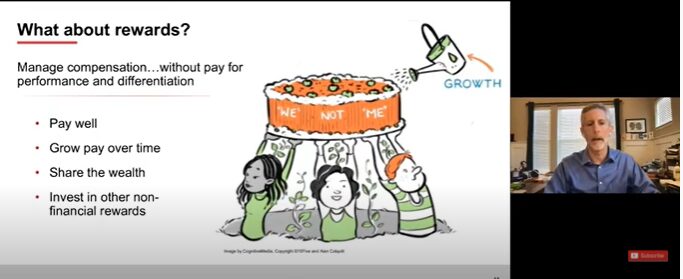
This article is sponsored by: Betterworks

Farai Mugabe, Content & Research, The HR Congress
WHY SHOULD YOU CARE?
Performance management is stuck in the past – we ignore the evidence and don’t challenge our assumptions and beliefs. It is time to rethink how we foster performance and leverage continuous performance enablement to drive engagement, retention, and culture, on a regular basis.
The environment around us is continuously changing. The truth is always changing every day. What used to be true yesterday is now false. What used to be false is now true. Commonly held assumptions are no longer as authentic as before. Given such a changing world, most performance management systems have not changed for the past 40 years except for periodic adjustments meant to quieten the noise levels of employees. 1 Given such an environment, Alan Colquitt advised that we need to debunk the myth of performance management. This article gives a summary of Alan Colquitt’s insightful presentation entitled, “Debunking the myth of performance management.” 2
On 24 May 2022, the global HR community met together on an online webinar organized by the HR Congress. The event speakers were as follows: Andrea Lagan – Chief Operating Officer, Betterworks, Isabelle De Wulf – Director Talent & Organizational Development, Barco, Alan Colquitt – Author: Next Generation Performance Management: The Triumph of Science Over Myth and Superstition, and Amy Culverhouse – Enterprise Sales EMEA, Betterworks. Alan Colquitt’s presentation was entitled, “Debunking the myth of performance management.”
In their 2022 Global HR Report, Betterworks defines performance enablement as a better model for performance management focused on developing the right infrastructure critical to support each employee’s performance potential and help them progressively attain their career goals.3 In this process, performance enablement focuses on creating an environment for employees to thrive and contribute to their best for the organization while achieving their career goals. In the presentation, Alan Colquitt defined performance enablement as centered on the following key issues:
- Individual and team goals are central and should be flexible and transparent
- Continuous feedback and communication through one-on-one and team meetings
- Coaching and support development to enable progress
- Regular monitoring of mood
- After-action reviews
- Simple documentation
- Simple technology
- Heavy manager support

Performance management is a wicked problem
In 2019, Gartner indicated that 81% of HR leaders were making changes to performance management. 4 In the presentation, Alan Colquitt said, “Performance management is more of a wicked problem. Everybody is unhappy. All the stakeholders are unhappy.” A wicked problem is a social or cultural problem that is difficult or impossible to solve because of its complex and interconnected nature. Wicked problems lack clarity in both their aims and solutions. Performance management is a complex issue that has been mixed with huge flaws and controversies. 5 In 2018, M. Tamra Chandler shared an eye-opening presentation entitled, “How performance management is killing performance: The 8 fatal flaws.” M. Tamra Chandler helped show how traditional performance management is failing companies because it is stuck in the past.5

Performance management is about pay distribution
Employees are willing to go the extra mile if they have a financial benefit for their efforts. This can be traced to the tenets of scientific management, which indicate that employees are economic men who are motivated by money and are willing to go the extra mile if their efforts are tied to rewards. It remains true that employee performance data remains critical for making key decisions related to promotion, pay progression, compensation, and reward.

Companies are increasingly concerned with pay for performance as they embark on a great escape from the pandemic. Companies can retain top-performing talent, motivate staff to go the extra mile, and offer equitable rewards by paying for performance.
Performance management systems remain stuck in the past
The world has changed, yet performance management systems have not changed. The pandemic killed the traditional workplace and ushered in a new world of agility, pace, excellence, and innovation. Despite these changes in the world around us, some organizations have not yet realigned their performance management systems that have become rigid in a new world of hybrid work and digital technology. Performance management systems remain modeled for a simple and less complex world. However, the world we have now is complex and requires new solutions. Companies have to remodel their performance management systems so that they become aligned with the new world demands.6

What do we change?
Alan Colquitt advised us to step back, rethink, and reset performance management. We must try to understand what performance management means for us in the modern-day workplace. This requires using an organisation design lens, such as the popular McKinsey 7s model.

Resetting control systems
Performance management is a control process whereby managers must re-examine their control processes. Control is about measures and means used to channel behaviours and variables positively with the ultimate goal of getting desired results. There are two main approaches to control: coercive control and enabling control. Coercive control is centered on a traditional approach, including using force and limiting freedoms. It also includes hierarchy, strict rules, prescriptiveness, punishments, and strict adherence to processes. Coercive control has been seen as less effective.
On the other hand, organisations now need to focus on enabling control. Organisations have to rethink how they can make performance better. Enabling control empowers employees to take charge of their work and attain their very best. Aspects of enabling control include purpose, belonging, meaning, creating the right culture, and transparency.

What about rewards?
Alan Colquitt said, “It is difficult to reform performance management without reforming rewards.” Companies should also seek ways to disconnect performance management from rewards. There are a number of means by which employers can recognise their employees rather than pay. This includes saying, “Well done” or “Thank you” when employees do well. Good, compassionate leadership, as well as learning and setting clear goals are also critical elements of enabling employee performance. Companies have to think about performance-related pay if they are to enable performance. Despite that, companies still have to pay well, have a good pay progression model, and pay equitably.

In conclusion, performance management is moving towards performance enablement. The drive is to create the right infrastructure that is critical to support each employee’s performance potential and help them progressively attain their career goals. Performance management is an action word, yet current performance management systems remain stuck in the past. Companies have to remodel their performance management approaches to enable performance.
…
1Performance Management as Organisational Control: Breaking free from the Ghost of PM’s Past, by Alan Colquitt
2Performance@Work – From Performance Management to Performance Enablement, by Mihaly Nagy
32022 Global HR Research Report. The state of performance enablement: Redefining performance management to develop top talent and reduce churn, by Betterworks, Betterworks
https://www.betterworks.com/thank-you-for-reading-the-state-of-performance-enabement/
4The real impact on employee of removing performance ratings, by Jackie Wiles, Gartner
5How Performance Management is Killing Performance: The 8 Fatal Flaws of Performance Management, by Mihaly Nagy and M. Tamra Chandler
https://hr-congress.com/2022/05/03/the-8-fatal-flaws-of-performance-management/
6COVID Killed the Traditional Workplace. What Should Companies Do Now? , by Dina Gerdeman
https://hbswk.hbs.edu/item/covid-killed-the-traditional-workplace-what-should-companies-do-now
Written by: Mihaly Nagy
Betterworks Future of Work HR Strategy Performance Management
Previous post

- 4273
- 5
labelPartner Content today2022.05.30.
Reimagining Performance Management, Goals and Result at the Hybrid workplace
Recorded on 24th May, 2022Underwriter: Betterworks Panel Discussion: Reimagining Performance Management, Goals and Result at the Hybrid workplace – do’s and don’ts. Alan Colquitt – Author of Next Generation Performance [...]
Similar posts

labelArticles today2024.10.21.
The success-recipe to build agile and future-ready organizations in 2025 and beyond








Post comments (0)